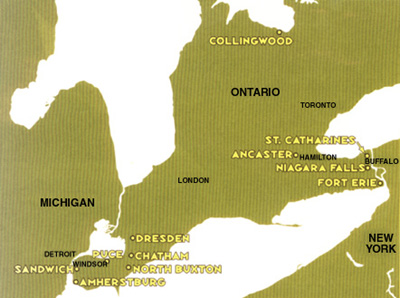Hiram
Wilson
Hiram Wilson was born on September
25, 1803, in Ackworth, New Hampshire, the son of John Wilson and Polly McCoy.
He attended the Oneida Institute, an institution that incorporated both
education and manual labor, and he then studied theology at Lane Seminary
in Cincinnati, where he joined the group of rebels who left for Oberlin
College. He received his theological degree from the Oberlin Theological
Seminary in 1836. That same year, he was given twenty-five dollars by Charles
Finney to travel to Upper Canada and observe the situation of fugitive slaves
there. |
| He returned to Canada the following
spring as a delegate of the American Anti-Slavery Society. He then began
raising and borrowing money in order to establish an educational institute
for fugitive slaves. By 1839, Wilson had established ten schools and recruited
14 teachers, most of whom were Oberlin graduates. His work gained the attention
of Gerrit Smith of Rochester, New York, and Quaker philanthropist James
Cannings Fuller of Skaneateles, New York. Gerrit Smith's Rochester committee
helped supply Wilson’s schools with Bibles, clothing, and money, and
Fuller raised much of the money necessary for the foundation of the British-American
Institute, established by Wilson, Fuller, and ex-slave Josiah Henson at
Dawn, near Chatham, Canada West. The intent of this institute was to integrate
labor and education and introduce ex-slaves to the capitalist system in
order to make them into self-sufficient freedpersons. The institute opened
on December 12th, 1841. |
|
| Wilson acted as
head of the institute until 1849, and he visited England during the World
Anti-Slavery Convention in 1843. Although the Dawn settlement had a fairly
successful lumber industry, the institute suffered from internal conflicts
and financial instability. Wilson resigned from the institute in 1849 and
established another fugitive haven in St. Catharines. He opened an American
Missionary Association school there with his second wife. He housed approximately
125 refugees in his own home between 1850 and 1856. He also established
a Sunday school in St. Catharines, but he abandoned his labors in 1861,
possibly because of political or financial issues. Wilson died in St. Catharines
in April 16th, 1864 |
